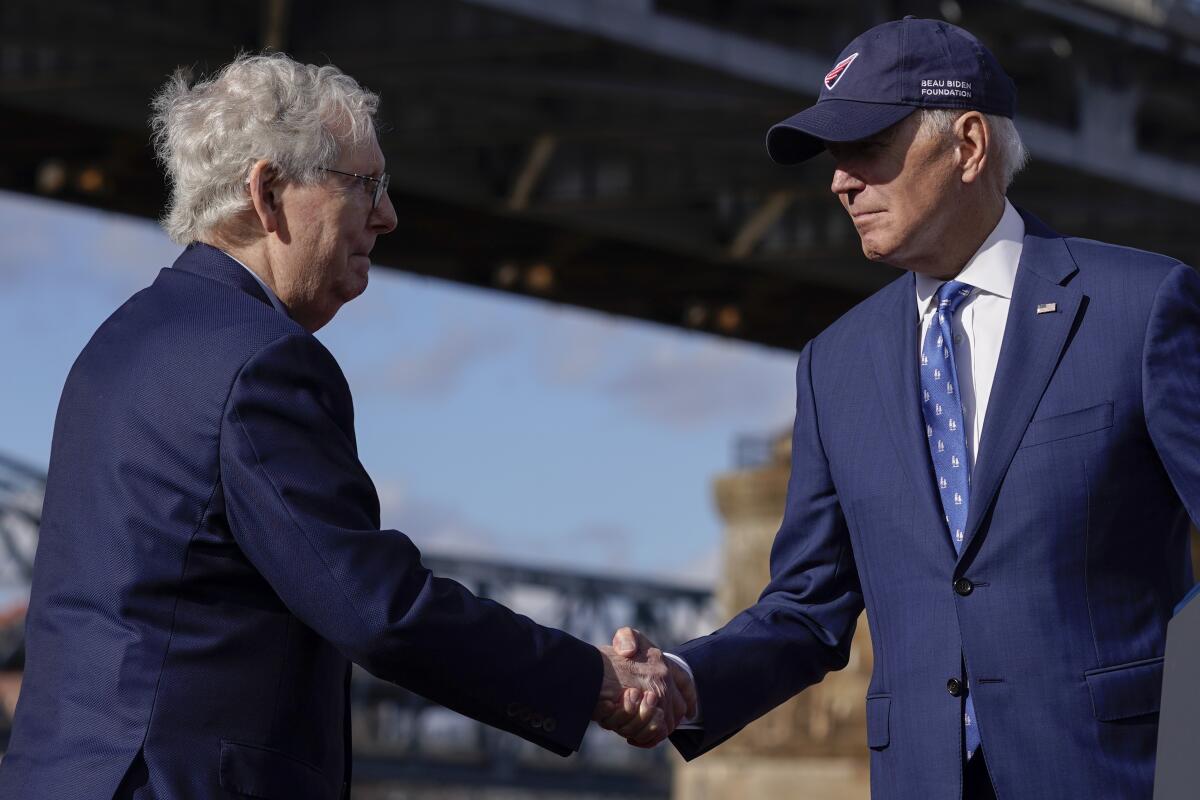The real winner from the House fight? Mitch McConnell, the Senate’s indispensable man

- Share via
WASHINGTON — The television split screen told the story.
On one side, Republicans in the House of Representatives labored through the fourth of the 15 ballots they needed during four days of gridlock to choose Rep. Kevin McCarthy as speaker.
On the other side, Senate Republican leader Mitch McConnell stood beaming with President Biden as they congratulated each other for a bipartisan success: a $1.6-billion deal to replace a crumbling highway bridge across the Ohio River.
Republicans have increasingly embraced political leaders who flout restraints. The Jan. 6 riot and the hijacking of the race for speaker stem from that same root.
On one side, partisan dysfunction. On the other, an old-fashioned deal.
Biden seized the moment to ladle compliments on his longtime sparring partner — and to drive home a lesson.
“We disagree on a lot of things,” he said of McConnell (R-Ky.). “But here’s what matters: He’s a man of his word. … I believe it sends an important message to the entire country: We can work together. We can get things done.”
McConnell wasn’t daring enough to praise Biden, but on the larger issue he responded in kind.
“These are really partisan times,” he said. “But I always feel no matter who gets elected, once it’s all over we ought to look for things we can agree on.”
If there was a winner in the brawl on the House floor last week, it wasn’t McCarthy (R-Bakersfield). McCarthy got the speaker’s job, but gave away so much power along the way that it was probably a Pyrrhic victory. He still faces the challenge of herding an untamable majority with only four votes to spare, amid in-house critics who would gladly see him fail.
The real winner was a man who wasn’t there: McConnell, the phlegmatic leader of the nonanarchic Senate GOP.
At some point in this year of divided government, Congress will steer into a crisis — a standoff over the federal debt limit, perhaps, or gridlock over government spending. Only one person on the Republican side will have the power and skill to avert catastrophe, and it won’t be McCarthy; it will be Biden’s wily, unlovable colleague, McConnell. Thanks to the dysfunction in the House, he is now Congress’ indispensable man.
That’s why Biden was doling out compliments underneath the giant bridge that connects northern Kentucky to southern Ohio. He knows he’s going to need McConnell’s help.
The infrastructure bill that passed Congress in 2021 was a high-water mark for bipartisanship on McConnell’s part; he supported it in large part because it included the bridge, a project he’s worked on for decades.
But Congress still needs to pass spending bills to keep the government running. And in the second half of the year the Treasury expects to hit the debt ceiling, the legal limit on federal government borrowing (currently $31.4 trillion).
At that point, Congress will need to raise the limit to avert a default that could crash the financial markets.
We’ve seen this movie before. In 2011, during President Obama’s first term, tea party Republicans in the House, the precursors of today’s Freedom Caucus, threatened to let the federal government default on its debts.
The House speaker at the time, John A. Boehner (R-Ohio), couldn’t govern his own majority; White House aides joked that Boehner “couldn’t deliver a pizza.” It took weeks of negotiations between McConnell and Biden, Obama’s vice president, to produce a deal that raised the debt ceiling in exchange for long-term deficit reduction. (The deficit didn’t stay down for long, but the crisis was averted.)
McConnell has a sound political reason for working with Democrats: He believes his party has damaged itself by acquiring an image as the party of chaos.
The GOP came agonizingly close last year to winning a majority in the Senate and restoring McConnell to the job he wants most, majority leader. But voters rejected candidates chosen and endorsed by former President Trump — Herschel Walker in Georgia, Mehmet Oz in Pennsylvania, Blake Masters in Arizona — and the Senate remained in Democratic hands.
Independent voters and moderate Republicans concluded “that we were sort of nasty and tended toward chaos,” McConnell said last year in an interview with NBC.
“They didn’t have enough confidence in us, in several instances, to give us the majority,” he said.
His goal is to detoxify the GOP’s image by steering toward a more orderly version of conservatism.
“We have a high bar to get over in asking the American people for governing responsibility again,” Scott Jennings, a former McConnell aide, explained last week. “The independents in the midterm let us know that we haven’t yet met that bar. But we damn well better get there if we hope to win the White House and win back the Senate in 2024.”
McConnell hasn’t turned into a moderate. After the election, he summed up his agenda in partisan terms: “We’re going to fight Democrats’ recklessness and promote our common-sense conservative values.”
But like Biden, he knows that cutting deals can help him politically.
The next two years in Congress will see more collisions than cooperation between the two parties.
But between McConnell and Biden, it might also include a few more opportunities for bipartisanship — just when it’s needed most.
More to Read
Get the L.A. Times Politics newsletter
Deeply reported insights into legislation, politics and policy from Sacramento, Washington and beyond. In your inbox twice per week.
You may occasionally receive promotional content from the Los Angeles Times.












